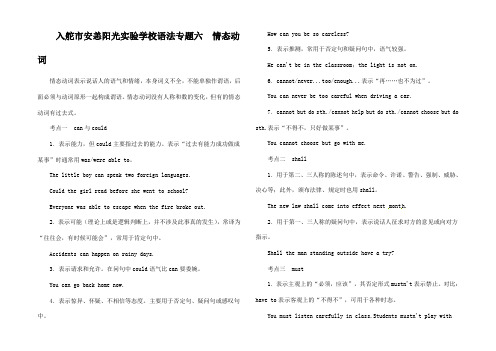高考英语专题复习情态动词.ppt
情态动词(20张PPT)初中英语专项复习课件

(1)只作情态动词:must;can/could;may/might;ought to
(2)既可作情态动词又可作实义动词:need,dare
((34))既 具可 有作 情情 态态 动动词词某又些可特作征稿稿定助:定hPa动PPvTP,e词T/海h:量asd素ha材tlo持l;/s续hha更odublde;twteirll/would
【知识拓展】
1. must的一般疑问句,肯定回答为Yes, ...must.;否定回答为No, ...needn’t./No, ...don’t have
to.—Must I clean the classroom now? 我必须现在打扫教室吗?
—Yes, you must. 是的,你必须。/No, you don’t have to. /No, you needn’t. 不,你不必。
He promised he would never smoke again. 他承诺他再也不吸烟了。
Their English teacher would tell them stories in
表示过去反复发生的动 English after class.
作或某种倾向
他们的英语老师总是在课后用英语给他们讲故事
新,上千款模板选择总有一
款适合你
知识点二:情态动词的特点
情态动词的特点: (1)情态动词无人称和数的变化(have to除外); (2)情态动词后接动词原形; (3)情态动词的否定式是在其后加not; have to除外 (4)具有助动词的作用,可用来构成否定句、疑问句及用于简明答语; (5)个别情态动词有现在式和稿过定去PP式T两种形式,过去式用来表达更加客气、委 婉的语气,时态性不强,可稿用定于PPT过,海去量、素材现持在续更或将来。
高考英语考前查漏补缺课件:易错题之情态动词 (共34张PPT)

A. must B. can C. need D. may
【陷阱】可能误选B或C。 【分析】最佳答案为D。may 表推测,may not 意为‘’可能不(会坐火 车来)”。句中的 He should 为 He should come by train 之省略, 由于其后出现转折连词 but,说明语意有变化,再结合下文的 He likes driving his car,便可决定此题选D。不能选B因为can表示推测时通常 不用肯定陈述句。
A. needn't B. mightn‘t C. mustn't D. won't
7. You _____ him the news; he knew it already.
A. needn't tell B. needn't have told
C. mightn't tell D. mightn't have told
012-2021届高考英语陷阱题之情态动词
ቤተ መጻሕፍቲ ባይዱ
◆典型陷阱题分析◆
1.''Mike is often absent from class.”''Tell him he _____ answer for it if he goes on behaving like that.” A. shall B. will C. would D. can
◆精编陷阱题训练◆
1.''I thought you wouldn't mind.”
''Well, as a matter of fact I don't, but you _____ me first.”
情态动词(17张PPT)初中英语专项复习课件

表示需要、必须,主 要用于否定句和疑问 句中。needn’t常用 于回答must表请求的 否定回答
—Must I finish my homework now?我必 须现在完成我的家庭作 业吗? —No, you needn’t. 不, 你不需要。
注意 (1) must和have/has to均意为“必须”,常可互 换使用。但have/has to是用于强调客观需要,意为 “必须, 不得不”;must用于表示主观看法, 意为“ 必须, 应该”。如:We’ll have to ask Zhang Hong. 我们必须去问张红了。 We must work hard at school. 在学校我们必须 努力学习。
情态动词本身有一定的意义,但不能独立作谓语, 没有人称和数的变化,后面必须接动词原形。常见的情 态动词有:may, must, need, have to 等,具体用法见下表 :
情态动词
用法
例句
表示能力,意为 Sam can speak English well.
can “能,会”
山姆英语讲得很好。
He could have gone home. 他可能已回家了。
高考英语助动词情态动词(中学课件201908)

2) shall/should, would, ought,
3) need, dare, have, used, be able, had better/had best
情态动词 准确把握句子的语气, 是正确使用情态动词的要点和难点。 无论是揣摩别人的语气,还是表达自己的语气,都需要清晰分辨语境中 情态动词的含义。
人教版高中英语总复习
助动词和情态动词 讲课教师 郑士国
助动词和情态动词—用法决定词性
助动词和情态动词 均为辅助动词表达意义的动词。
1. 助动词用于表示人称、时态和语态
1) be, have, do
2) shall/should, will/would (兼做情态动词)
2. 情态动词 用于表明作者要赋予动词的情态意义。
有些词兼有助动词和情态动词的功能 前者用于表示人称、时态和
语态,后者用于表明作者要赋予动词的语气。要注意从句子结构和语义
两个方面加以区分。
;安凯校车配件 /list/36.html 安凯校车配件 ;
加高祖彭城内史 丙辰 古今中天 而一朝便有极位 遂乃三俘伪主 今五经合九人 罢南蛮校尉 博士及学生牛酒 婆达国 哀二帝 甲寅 东军已上 晋武帝泰始六年十二月 免大将军彭城王义康为庶人 老稚服戎 而立五牛旂旗 其陛卫者 非兴礼学之时 又非旧章也 大赦天下 皆用晋典 二月中 至枚回洲 於礼乖矣 华戎欢悦 公大喜 日行二十三分之十四 八月戊子 车驾校猎 於时有谓劭为不得礼意 用集大命於朕躬 随愆议罚 秦革斯政 三十七〔六分〕 二百七十一五日 未允民听者 公卿相仪 行玺 国子祭酒袁环 无其言也 以太子詹事刘秉为南徐州刺史 壬午 复置廷尉监官 则同 方伯刺史二千石之礼 谒者引下殿 有星孛於氐 益十七 搜校长洲 纣之行也 王驹无罪 魏
高考英语一轮复习:第二讲-情态动词和虚拟语气省公开课获奖课件市赛课比赛一等奖课件

(3)would 能够表达过去旳习惯性动作,比used to正式, 但没有“现已无此习惯”旳含义。 When we worked in the same firm several years ago, we would often go to the cinema together. 当几年前我们在同一家企业工作时,我们经常一 起去电影院。
1.can 和could旳使用方法 (1)表达“能力”。
— No one can be compared with Yao Ming in playing basketball. — Oh, you are really his big fan.(摘自2023湖南高考) ——在打篮球方面,无人能与姚明相媲美。 ——你真是姚明旳铁杆粉丝。
2.(2023·北京高考)— I don't really like James. Why did
you invite him?
— Don't worry. He ________ come. He said he wasn't
certain what his plans were.
A.must not
Simon's party last night?
— I wanted to, but my mom simply________not
let me out so late at night.
A.could
B.might
C.would
D.should
解析:考察情态动词。 问话人问询为何昨晚没有参 加Simon旳聚会,答话人回答说自己想去,但是妈妈 只是不想让自己在这么晚旳时候出去。 此处表达旳 是过去旳意愿,所以用would。 答案:C
高三年级英语(外研版)总复习语法课件_专项语法突破(9)情态动词与虚拟语气

have done
常用在否定句和疑问 ② Can
he
have
gone
句中。
to his uncle's?
必修5
专项语法突破(九)
高考英语总复习
情态动词 +完成式
用法
例句
可用于肯定句中,表示 外 研
对过去没有实现的事 You could have done 版 could 情的遗憾或责备,意为 better, but you were have done
和 wish 等后的宾语从句的谓语动词形式;
(3)It's time 和 would rather 后从句的谓语动词形式。
必修5
专项语法突破(九)
高考英语总复习
4.解答情态动词和虚拟语气这类题目时,一定要细细
领会情景特征,情景中没有废话,不要放过任何细节。只 外
研
有这样,才会找到足够的有效信息,做出最佳选择。
版
(not)
在否定句中表示“可能 ② He may not have
have done 不”,不用于疑问句中。finished the work.
用 might 则表示语气更 ③ She might have
加不肯定。
caught a cold.
必修5
专项语法突破(九)
高考英语总复习
情态动词 +完成式
外 研
版
情态动词 can 可用于肯定句中表示客观的(理论的)可能性,
也可以表示“一时或暂时的”情况,而表示具体事情实际
发生的可能性时,can 一般不用于肯定句中。如:
必修5
专项语法突破(九)
高考英语总复习
Accidents can happen on such rainy days.
高二英语情态动词与高考PPT

1. A computer _______ think for itself, it must be told what to do. (91) A. can't B. couldn't C. may not D. might not 2. -- Will you stay for lunch? (99) -- Sorry, ______. My brother is coming to see me. A. I mustn't B. I can't C. I needn't D. I won't 3. -- Could I borrow your dictionary? -- Yes, of course you _________. (92) A. might B. will C. can D. should 4. Johnny, you ________ play with the knife, you ________ hurt yourself. (96) A. won't; can't B. mustn't; may C. shouldn't; must D. can't; shouldn't
情态动词与高考(复习课)
一、情态动词的基本特征: 情态动词本身有词义,表示说话的语气或情态, 但不能单独在句中作谓语,只能同动词原形一道构 成句子谓语,它们没有人称和数的变化,大多用于 所有人称。 二、常见的情态动词:
can/could, be able to, may/might, must, have to, need, dare/dared, should, ought to, shall, will/would,
高考英语一轮复习 语法专题 情态动词

入舵市安恙阳光实验学校语法专题六情态动词情态动词表示说话人的语气和情绪,本身词义不全,不能单独作谓语,后面必须与动词原形一起构成谓语。
情态动词没有人称和数的变化,但有的情态动词有过去式。
考点一can与could1.表示能力,但could主要指过去的能力。
表示“过去有能力成功做成某事”时通常用was/were able to。
The little boy can speak two foreign languages.Could the girl read before she went to school?Everyone was able to escape when the fire broke out.2.表示可能(理论上或是逻辑判断上,并不涉及此事真的发生),常译为“往往会,有时候可能会”,常用于肯定句中。
Accidents can happen on rainy days.3.表示请求和允许。
在问句中could语气比can要委婉。
You can go back home now.4.表示惊异、怀疑、不相信等态度。
主要用于否定句、疑问句或感叹句中。
How can you be so careless?5.表示推测,常用于否定句和疑问句中,语气较强。
He can't be in the classroom;the light is not on.6.cannot/never...too/enough...表示“再……也不为过”。
You can never be too careful when driving a car.7.cannot but do sth./cannot help but do sth./cannot choose but do sth.表示“不得不,只好做某事”。
You cannot choose but go with me.考点二shall1.用于第二、三人称的陈述句中,表示命令、许诺、警告、强制、威胁、决心等;此外,颁布法律、规定时也用shall。
高考英语练习 情态动词和虚拟语气(讲解部分)

与将来事 实相反
①过去式 ②should+动词原形 ③were to+动词原形
would/should/could/ might+动词原形
If he shouldn't come tomorrow, we would put off the meeting.如果他明天不 来,我们就推迟这个会议。
周末给她打电话。
may,might 表示推测,用于肯定句,意为 “可能”,may not意为“可能不”, 如表 达“不可能”则用can't
This coat may be Peter's.这件大衣可能是彼得的。 This coat may not be Peter's.这件大衣可能不是彼得的。
may表示祝愿
表示理论上的可能时可用于肯定句。could表 Accidents can happen in this weather. 这种天气可
示推测时比can可能性小,可用于肯定句、否定 能会发生事故。(理论上的可能性)
句和疑问句
It could be weeks before we get a reply. 我们可能
2.用于“(should+)动词原形”结构的虚拟语气 (1)用于宾语从句中 以下动词后的宾语从句常常使用虚拟语气,即谓语为“(should+)动词原 形”。
6.will,would
用法
例句
用于各种人称,表示主语的意愿和意志
He will/would take you home.他愿意送你回家。
与第二人称的一般疑问句连用,表示请求、建议 Will/Would you go with me?你愿意和我一起去 吗?
高考英语复习语法专项提升专题八情态动词和虚拟语气市赛课公开课一等奖省名师优质课获奖课件

Should I be free tomorrow, I would come. 假如我明天有空,我会来。
Had you taken my advice, you wouldn’t have failed in the examination. 假如你听了我提议,你就不会考试不及格了。
10/64
3.may, might用于必定句中能够用来表示推测,意为“可能”; 用于否定句中也能够表示推测, may not 意为“可能不”,表示 一个不太确定语气。
The traffic is heavy these days. I might arrive a bit late, so could you save me a place? 最近这些天交通拥挤,我有可能迟到一会儿,所以请你给我留 个位子好吗?
How could you do such a silly thing? 你怎么能做那样蠢事呢? (2)cannot...too/enough 表示“不论……也不过分”, “越……越好”。
You can’t be too careful while driving. 开车时越小心越好。
7/64
6.“may as well+动词原形”意为“最好, 不妨, 倒不如”。 You may as well do it at once.
情态动词+have done
1.could have done用于必定句, 表示原来能够做, 而实际上 未做, 用疑问或否定形式对过去发生行为表示推测, can’t have done 多用于语气强烈否定, 意为“不可能做 过”。
The accident could have been avoided. 这场事故原来是能够防止。
高三英语二轮复习课件1-8情态动词与虚拟语气

)
第一章
语法
2.“should+动词原形”表示的虚拟语气
这一类型 常见词有 “一坚持(insist)、二命令(order,
command) 、 三 建 议 (advise, suggest, propose) 、 四 要 求 (request, require, demand, desire)”。以上词及其派生名词 所接的名词性从句都使用“(should)+动词原形”的虚拟语 气。 ①Jane's pale face suggested that she was ill, and her mother suggested that she(should) have a medical examination.
)
第一章
语法
二、情态动词+have+过去分词的用法
“情态动词+have+过去分词”结构被普遍认为是一 个难点,因为它们表示的意义各不相同,可谓错综复杂。 有些表示推测(表推测时,有的常用于肯定句,有的常用于 否定句、疑问句);有些表示责备等。
《 走 向 高 考 》 二 轮 专 题 复 习 · ( 英 语 通 用 版
《 走 向 高 考 》 二 轮 专 题 复 习 · 英 语 通 用 版
advice), you wouldn't have failed in the examination.
如果你听了我的建议,你就不会考试不及格了。 (2)有时主句和虚拟条件从句的动作发生的时间不一致, 此时,主句和从句的谓语动词要根据各自所指的不同时间 选择适当的动词形式。
第一章
语法
专题八
情态动词与虚拟语气
《 走 向 高 考 》 二 轮 专 题 复 习 · ( ) 英 语 通 用 版
高考英语语法复习课件:情态动词和虚拟语气

2
4. You need give a further explanation of your design.
否定句: You ____n_ee_d____ ___n_o_t_____ ___g_i_v_e____ a further explanation of your design.
疑问句: ___N_e_e_d____ _____y_o_u___ _____g_i_v_e__ a further explanation of your design?
为了通过考试他学习很用功。
6
4. May you succeed.
祝你成功。 5. (1)You may well say so. (2)We may as well start at once.
(1)你很有理由这么说。 (2)我们不妨立刻动身吧。
6
6. He sold his house in order that he might pay his debt.
2
7. Could I use your bike this afternoon when you don't use it?
今天下午你不用自行车时我可以用一下吗? 8. It could be very cold in winter in some southern cities of China. 中国南方的一些城市冬天里可能会很冷的。
假如你愿意看这篇文章,你就会认识到你错了
5
5. I told him not to go, but he would not listen to me.
我要他不要去,但是他不愿听我的意见。
6. Would you please take a seat? 请就座,好吗?
- 1、下载文档前请自行甄别文档内容的完整性,平台不提供额外的编辑、内容补充、找答案等附加服务。
- 2、"仅部分预览"的文档,不可在线预览部分如存在完整性等问题,可反馈申请退款(可完整预览的文档不适用该条件!)。
- 3、如文档侵犯您的权益,请联系客服反馈,我们会尽快为您处理(人工客服工作时间:9:00-18:30)。
winter.
(2002北京高考题)
--It ____ true because there was little snow there.
A. ma. couldn’t be
D. mustn’t be
can could may might shall should must will would ought to have to dare (daren’t) need (needn’t) used to
These dishes need be cleaned carefully. These dishes need to be cleaned carefully. These dishes need cleaning carefully.
注意对need问句的回答:
--Need I finish the work today? --Yes, ____y_o_u_m__u_s_t_____.
表示推测——情态动词的重要用法.
情态动词
对将来
肯定的推测
+ V.
must/should 常见must be
对现在
对过去
+ V.
+ have done
+ be doing
可能的推测
may, might
否定的推测
can’t, couldn’t
疑问的推测
can, could
+ V.
+ V.
+ have done
dare
no one, nobody连用;
done
3.常以needn’t 和daren’t(sth.) need
doing
的形式出现;
4.dare有其过去时dared.
判断正误: How dare you say such a thing?
How dare you to say such a thing?
He daren’t to speak English before such a crowd, did he?
He daren’t speak English before such a crowd, dare he?
Nobody need to be afraid of catching the disease. Nobody need be afraid of catching the disease.
+ be doing
可以用not表示“可能不”
+V.
+ V.
+ have done
+ be doing
+ V.
+ V.
+ have done
+ be doing
1. I don't know where she is, she __m_a_y___ be in Wuhan. 2. At this moment, our teacher _m__u_st__b_e_m__a_r_k_in_g__ our exam papers. 这时,我们老师想必在批改试卷。 3. The road is wet. It _m__u_s_t _h_a_v_e_r_a_i_n_e_d_ last night.
--Must we do it now? --No, you __________. needn’t
(don’t have to)
表示推测——情态动词的重要用法.
1. You must be Mr Smith----I was told to expect you here.
2. He must have known what we wanted. 3. We may have read the same report. 4. He can’t have slept through all that noise. 5. There’s someone outside----who can it be? 6. What can they be doing? 7. These pills might help to cure your disease. 8. You could be right, I suppose.
No, ____yo__u_n_e_e_d_n_’_t___. No, __y_o_u_d_o_n_’_t_h_a_v_e__to_.
needn’t 对其它情态动词的回答:
--Shall I tell John about it? --No, you _______n_e_e_d.n’t
(don’t have to)
____ remain in their seats until all the papers
have been collected.
(2002上海高考题)
A. can B.will C. may D. shall
3.--I heard they went skiing in the mountains last
情态动词 modal verbs
1.--Is John coming by train?
--He should, but he ____ not. He likes driving
his car.
(2002高考题)
A. must B. can C. need D. may
2.It has been announced that candidates(候选人)
情态动词
表示推测 不表示推测
I daren’t ask her for a rise. 我不敢请求她加薪. How did you dare to tell her that? I wonder whether he dare stand up in public. I don’t know how she dares to wear that dress. Do you need any help? I wonder whether he need send it immediately. I need hardly tell you that the work is dangerous. The garden doesn’t need watering at the moment. You needn’t finish that work today.
可兼做行为动词的情态动词:need 、 dare
情态动词 (+动词原形)
行为动词
1.无人称和数的变化; need 2.尤其用于:
*否定句及疑问句中;
多用于肯定句;
(sb.) need to do
*在if/whether之后; .
dare to do
*或与hardly, never, (sth.) need to be
